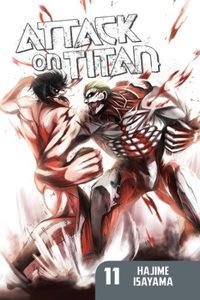 Title: Attack on Titan (Shingeki no Kyojin
Title: Attack on Titan (Shingeki no Kyojin
Genre: Action, Horror
Artist: Hajime Isayama
Publisher: Kodansha (JP), Kodansha USA (US)
Serialized in: Bessatsu Shonen Magazine
Translation: Ko Ransom
Original Release Date: January 28, 2014
If Hajime Isayama wants to end Attack on Titan in less than 20 volumes, we have a lot of ground to cover in very little time. Although there’s been plenty of surprising developments since Eren’s shocking “death” in the first volume, we still know relatively little about the Titans, where they came from, and what their goals are. Isayama hasn’t stopped hitting us with plot twist after plot twist, but hopefully these next few volumes supply us with more plot development and less character stagnation.
When Reiner and Bertholdt revealed themselves as the Armored and Colossus titans in volume 10, I honestly thought it was a joke. Obviously, as most everyone had suspected by that point, the Armored and Colossus titans were human-controlled, but by whom I couldn’t say. I expected an adult, some mastermind, Eren’s dad even, but not a couple of wishy-washy kids that look more like pawns than game masters. This isn’t the first time a secondary character has come out of the woodwork into a larger-than-life role with more importance than their meager personality initially let on, and although it does provide a lot of shock value, I think the big reveals would be a lot more effective if Isayama concentrated on character development more throughout the series. Not only would the story itself seem more robust and complex, but these shocking moments would have a bit more drama and emotional weight to them.
Nonetheless, Eren’s friends-turned-foes have a lot to answer to, and Eren’s titan form is going to be the one dishing out justice for the inconceivable crimes they’ve committed. There’s nothing all that new about the action scenes in this volume–it’s mostly Eren getting his butt kicked, and remembering at a critical moment some special move to help him turn the tides in his favor. Reiner, the Armored titan, is a particularly formidable foe with his hardened skin and incredible speed, but Eren’s reckless determination and wild strength is an equally difficult combination to beat. Just when it looks like Eren’s victory is in the bag, though, Bertholdt throws his humongous body onto Eren and Reiner, allowing the two to escape with Eren and Ymir (who got captured earlier) as hostages.

The rest of the volume is less intense physically; Mikasa and a few other members of the Survey Corps come up with a plan to rescue Eren and Ymir; Eren and the others are hiding out in a forest until nighttime, when Bertholdt and Reiner plan to take their captives to their hometown, and in the meantime Eren and Ymir have a lot of questions. We don’t really learn anything new from their talks, and it seems that most of the dialog in this volume is about Eren’s character. Pretty much everyone agrees that he’s far too reckless and needs to think before acting, and a few people, like Ymir, think he needs to grow up fast.
While all these points are true, it brings me to a bigger concern about the series as a whole: very few of the characters have actually changed since the beginning of the series, and fewer still have faced personal dilemmas that force them to confront themselves, the nature of war, and the fragility of life around them. As it is, most of the members of the Survey Corps look like scared kids forced into a bad situation because of all the war and death that surrounds them, but almost none of them (besides Mikasa) are willing to face what that really means. Sure, a few of them have confronted parts of their pasts, but these moments lack a general cohesion. What should be personal epiphanies that strengthen their goals and motivations and fortify their relationships with one another read as isolated side stories that fail to come together to impact the bigger plot.

And at their center is Eren, who exists as a force of nature rather than a human being, but because of his boldness and fearlessness, is the single thread that holds them all together. Sadly, though, he hardly seems capable of being a leader in any regard, although it’s not for lack of trying. By no means does he have to be a military strategist, but his lack of forethought and understanding of consequences makes him appear childish, and he often fails to realize that his actions put those he loves (Armin, Mikasa) in harm’s way. So far the only thing he does have going for him is his unrelenting spirit and faith in humanity, his empathy and compassion for his comrades, and while he often makes reckless decisions, at least he chooses to do something. I only hope that these next few volumes allow Eren to deal with the results of his own choices, to learn from them, and grow as a character so that he can be the savior that everyone looks at him to be.
 Title: Attack on Titan (Shingeki no Kyojin
Title: Attack on Titan (Shingeki no Kyojin
